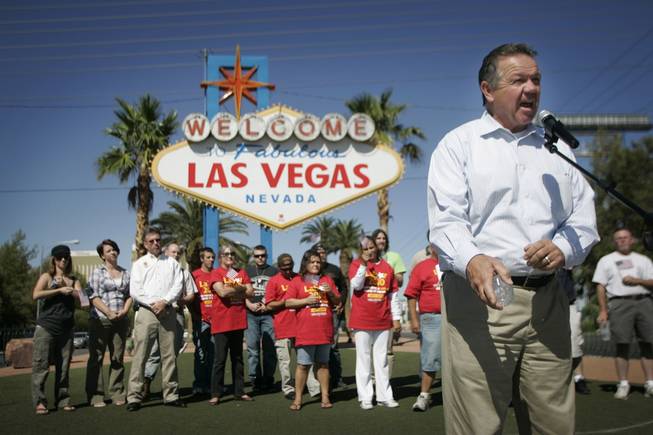
AFL-CIO Executive Secretary Treasurer Danny Thompson speaks last week at a news conference and rally to urge congressional leaders to create jobs for Nevadans.
Tuesday, Oct. 12, 2010 | 2 a.m.
Sun Coverage
Sun Archives
- An unintended interest group: The unemployed (9-13-10)
- Union’s attack ad in Dina Titus-Joe Heck race stoops to lies, fearmongering (8-26-10)
- Claims of deep teacher layoffs under Sandoval based on ‘what ifs’ (7-29-10)
- Will firefighters union endorse Brian Sandoval instead of Rory Reid? (6-28-10)
- Tone of card-check support shifts (11-30-08)
- Card check: Democrats can expect fight (11-7-2008)
- ‘Card check’ ads bypassing Nevada (10-21-2008)
- Election could help fulfill union dream, management nightmare (10-19-2008)
Nevada Democrats are distancing themselves from labor unions this election season, signaling a shift in the relationship between the party and its longtime allies.
The reasons are both political — unions have fallen in the eyes of the public during the recession — and economic — labor’s pockets aren’t as deep as they once were, cutting into funding for political activities.
The candidates still see value in union endorsements, and sources say Democrats are hitting them up for campaign contributions. But how they use the political capital of union endorsements has shifted.
Endorsements have been released on campaign websites rather than at splashy news conferences. Members-only e-mail blasts have replaced glossy mailers from candidates. Door-to-door visits supersede radio ads.
Rory Reid, the Democratic nominee for governor, has held campaign events with teachers. But he notably did not invite representatives of the teachers union — a group that has endorsed him over GOP nominee Brian Sandoval — to the unveiling of his education plan.
As he campaigns for re-election, Assembly Majority Leader John Oceguera, the Democrat in line to be speaker and a North Las Vegas firefighter, has called for making it easier to fire teachers, an issue that puts him at odds with the union.
Reid, chairman of the Clark County Commission, has vocally challenged the county firefighters union for what he says is a reluctance to scale back labor costs. The union has responded by going door-to-door against him.
Some political observers have suggested the firefighters’ opposition to Reid might be a political boon, casting the candidate in the role of taxpayer-friendly tough negotiator. It’s a sharp contrast to two years ago when police and fire union endorsements were seen as essential gold stars in local government races.
Fred Lokken, professor of political science at Truckee Meadows Community College, said labor has been quieter this campaign than in the past. In particular, there is resentment toward public employees unions, and that has demoralized their membership, he said.
“They feel kicked,” he said. “This is not a glory time for them.”
Union leaders and campaigns are reluctant to publicly acknowledge the shifting relationship. Democratic candidates don’t want to alienate a key constituency — they still need their votes and assistance getting supporters to the polls — and unions don’t want to admit they have an image problem.
And to be sure, candidates have made some low-key appearances with unions. Reid held a round table this summer in Reno with teachers and union leadership. His father, Senate Majority Leader Harry Reid, held a public event with law enforcement. Several candidates have held informational forums with union members.
Still, polls show the political reasons behind the shifting dynamic, as the public’s view of unions has fallen to the lowest levels in decades. Only 41 percent had a favorable opinion of unions this year, down from 58 percent in 2007, according to a Pew Research Center poll. Six in 10 people said labor unions have too much power.
Contributing to their lower profile, unions lack the resources that supported their political efforts in recent years. Their members are struggling with unemployment — the construction trades have been particularly hard-hit — and money to donate to political campaigns is in short supply.
In the 2008 election cycle unions had the financial resources to hire campaign workers, book large media buys and file lawsuits to try to dictate where people could caucus. Unions this year are keeping their budgets in mind and taking a more subdued approach to campaigning.
“As a function of the economy, union members are somewhat less active this political cycle than they have been in the past,” said Dan Hart, a Democratic political consultant and adviser to the state’s teachers union. He attributed the different role to the economic slump and members “more concerned about putting bread on the table than what’s happening in the political arena.”
They still want to exert their influence, they’re just doing it more quietly, experts said.
The Culinary Union has about 80 people on leave from their jobs to canvass in Nevada. At the height of the Obama campaign in 2008, it had about 100. The state AFL-CIO for months has been conducting phone banks for Reid, sending out mailers and visiting members’ job sites.
“They can probably focus on a few less races,” said Billy Vassiliadis, a Democratic political consultant.
Most recently, the AFL-CIO held an event at the Welcome to Fabulous Las Vegas sign to underscore Harry Reid’s job-creating efforts. The majority leader did not attend.
“Harry Reid is the top of the ticket,” said Danny Thompson, executive secretary-treasurer of the Nevada AFL-CIO, when asked why other Democrats weren’t highlighted at the event. The group has also endorsed Democratic incumbent Rep. Dina Titus.
Unions say they are focused on ground efforts and educating their ranks about the candidates in the hope of swaying votes Democratic. Working America, the AFL-CIO’s community affiliate, has reached out to unemployed members to encourage the jobless to vote for Democrats.
In 2008, unions helped drive turnout, which far exceeded expectations. Democrats hope they can do the same this year.

Join the Discussion:
Check this out for a full explanation of our conversion to the LiveFyre commenting system and instructions on how to sign up for an account.
Full comments policy